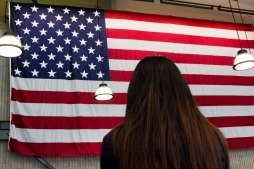 By Fernando Lopez Duran
By Fernando Lopez Duran
College students with DACA cannot receive federal-financial aid to pay for school but they can apply for certain scholarships.
DACA stands for Deferred Action for Childhood Arrivals. It was an executive order by President Barack Obama implemented August 2012. DACA provides deportation relief to individuals who were brought into the country as undocumented children. Once they are approved they can stay in the country to work and go to school. It does not provide a permanent legal status or pathway to citizenship.
According to the latest data from the U.S. Citizenship and Immigration Services, since inception nearly 800,000 initial requests have been submitted to apply for DACA. Approximately 13,000 came from Nevada and close to 12,000 of those were approved.
Frank McPherson, assistant director for the Office of Financial Aid at CSN, said that there’s no easy way to track how many DACA recipients are students at the College. Those that do identify and apply for help can receive assistance with scholarship applications.
“Unfortunately with DACA students… the federal government has not been quite so kind to recognize and allow [them] to receive a modified financial-aid package or something along those lines,” McPherson said. He wishes there was more access to federal funds.
Some states allow these individuals to receive in-state pricing for college tuition. Nevada is one of those states but DACA students must self-fund their way through college or rely on scholarships to complete their degrees.
The most common is Governor Guinn Millennium Scholarship. The scholarship is available to resident students who have graduated from high school with academic achievements. Financial need or citizenship status is not part of criteria.
CSN Student Government President Brenda Romero, who herself has benefitted from DACA, wanted to go to college but didn’t know how she was going to pay for it.
“After I graduated, I did take a year off because I didn’t know that I could use the Millennium,” Romero said. She is now attending CSN with the Scholarship.
Some have shown concern over the possibility of DACA being repealed if a Republican wins in November. This is something that current front-runner Donald Trump has vowed to do in his first few days in office. This is a polarizing topic that could affect many students.
“For me, more than anything, [the election] is just about protecting my family,” said Karla Rodriguez, a DACA student attending Nevada State College. Rodriguez wants to keep her status and ability to attend school. The election is important to her. She supports activism in her role as an immigration organizer at the Progressive Leadership Alliance of Nevada.



